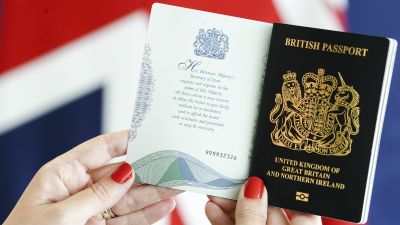When you need to renew a passport to travel to Europe

Since Brexit, passport rules for UK visitors to the European Union (EU) have tightened up.
But many people may not be aware of the finer print, and some families are finding themselves thousands of pounds out of pocket when they have been banned from boarding flights due to the rule changes.
So what exactly are the rules for British travellers to the EU, and how can you avoid a passport disaster if you're jetting off for the Easter holidays?
How have the rules changed?
When the UK was a member of the EU, British passports remained valid up to and including their expiry date for travel to other EU countries.
But post-Brexit, British passport holders wishing to travel to EU countries in the Schengen Area are treated as non-EU nationals. This includes popular tourism destinations such as Portugal and Greece.
As such, they must meet two key requirements, as outlined on the EU's Your Europe website. If you are a non-EU national wishing to visit or travel within the EU, you will need a passport:
which is valid for at least three months after the date you intend to leave the EU country you are visiting;
which was issued within the previous 10 years.
This means you should really be looking at the date of issue when checking if you need to renew, as well as the expiry date.
It may appear that your passport is within date, but if it hasn't been issued in the past 10 years you could be stopped from boarding your plane or ferry.
Have you heard our new podcast Talking Politics? Every week Tom, Robert and Anushka dig into the biggest issues dominating the political agenda…
According to the government's website, for some Schengen countries, once the three-months-remaining rule is taken into account, a passport needs to have been issued no more than nine years and nine months ago.
What is the Schengen Area?
The border-free Schengen Area is made up of 27 countries and guarantees free movement to more than 400 million EU citizens, along with non-EU nationals living in the EU or visiting the EU as tourists.
It is comprised of most EU countries, except for Croatia, Cyprus, and Ireland. Bulgaria and Romania will be part of the Schengen Area as of March 31 2024. The non-EU countries Iceland, Norway, Switzerland and Liechtenstein are also part of the area.
Aren't all passports only valid for 10 years?
Until September 2018, the UK had a policy that meant you could claim credit on 'unspent' time when renewing your passport, so you could be issued with a passport that was valid for up to 10 years and nine months.
People who took advantage of this policy could now find themselves caught out.
Do the rules affect children's passports?
Passports for under-16s are usually valid for five years, so there should be no chance of breaching the 10-year rule.
But be careful of the three-months-remaining rule, which states your passport must be valid for at least three months after the date you plan to leave the country. Children's passports are more likely to get caught out by this rule as their passports don't last as long.
Am I covered if I get caught out?
Unfortunately, if you don't make sure your passport will be accepted before you travel, you are unlikely to get back any money you lose.
Rory Boland, Editor of Which? Travel, told ITV News: “There has been confusion over guidance for travel to the EU. Passports must be issued within 10 years of entry into your destination country and remain in date for at least three months after the day you plan to return to the UK.
“It is essential to ensure your passport is valid when you are due to travel and return home. Otherwise you risk losing the money for your flight or holiday as your provider will not refund you, and insurance will not cover you for the error.”
Do the rules apply anywhere else in the world?
These rules are specific to Schengen Area countries. If you are travelling to the rest of the world you should check the individual rules for entering those countries on the government website.
When should I renew my passport?
To be on the safe side, it's best to apply to renew your passport before it is nine years and nine months old.
You should allow up to 10 weeks to receive your passport, so you should apply for it at least 10 weeks before you're due to travel. The Passport Office say people usually get their passports within three weeks.
You can apply online (£82.50) or by post with a paper form (£93). Passport costs are set to increase by more than 7% in April, the Home Office announced this month.
If you need a passport urgently, you can pay more for the fast track service. The one-week service costs £155 for an adult passport and £126 for a child passport, while the one-day premium service costs £193.50, or £204.50 for a 54-page frequent traveller passport.
Want a quick and expert briefing on the biggest news stories? Listen to our latest podcasts to find out What You Need To Know…